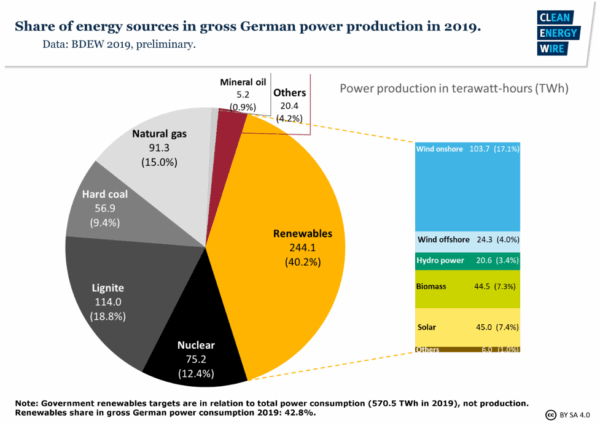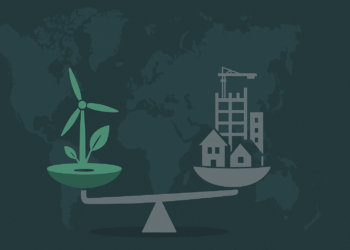The Imbalance Between Green Transition and Development: The Way Out
Introduction
Germany has set ambitious agenda to facilitate green transition and reduce greenhouse gas emissions. For instance, The German government has sought to reduce GHGs emissions by 65 % by 2030. This further extends to a net-zero emission objective by 2045. However, these climate targets outlined in the 2021 Climate Protection Act are not deemed feasible by government climate advisers and the Federal Environment Agency (UBA) for multiple reasons. The complex interplay of Russia’s invasion of Ukraine and the disruption of Russian gas imports, the government’s decision to shut down the nuclear stations and the rapid green transition taking place without considering socio-economic impacts have collectively caused popular discontent towards climate policies. Little has been done to address the imbalance between meeting climate targets and maintaining sufficient levels of economic and social development.
WHAT IS THE CURRENT PROBLEM/SITUATION?
The major problem lies in the short-sight of the German policy-makers when drafting such ambitious goals and the rapid mechanism of implementation. these climate targets need huge funds to finance which the government does not possess. Additionally, the German ruling coalition imposed this climate strategy on both the people and private sector without adequate facilitations or awareness.
Rather, It was a forcible climate adaptation plan manifested through lifting subsidies off energy and closure of nuclear stations. These policies backlashed due to its multi-faceted repercussions. Therefore, living costs skyrocketed and sophisticated industries need energy levels beyond current renewable energy production ones (52 %). Thus, almost half the German energy production is not renewable nor subsidized.
Figure 1. Pre-Crisis German Energy Production

WHY SHOULD IT BE A PRIORITY AT THIS MOMENT?
The German government should take urgent measures to balance green transition and socio-economic stability to meet these following ends:
Avoid further delays in the green transition process, Reports show that Germany maintains CO2 levels already 40% below the 1990 level. Nevertheless, this is not sufficient and it could not accelerate the transition unless there is public support for green policies.
Improve the ruling coalition’s polling ahead of the 2025 election, as the coalition members, SPD, Greens, and FDP poll at 14 %, 13 % and 4 % respectively. These poor results can be attributed to the coalition’s failure in considering a transformational approach that takes into account vulnerable communities and stakeholders. Thus, more popular parties such as the AFD can assume office next year which threatens the climate cause due to its anti-climate stance.
Economic Drivers:
Germany’s phase-out of nuclear power and coal has created a significant reliance on renewable energy sources, particularly wind and solar. However, these sources are intermittent, leading to concerns about energy reliability and security. The country has had to increase its natural gas imports, particularly from Russia, to fill the gap, which has raised geopolitical concerns and vulnerabilities. Post-2022 Ukraine War and the disruption in the Russian gas imports have led to an almost sole German reliance on renewable energy whose current productions levels are not sufficient to stabilize the economy and cover energy-hungry German industries.
Therefore, Germany emerged as one of the worst performers in terms of economic growth in the EU in 2023. Germany’s economy shrank by 0.3 percent in 2023, in contrast to the 0.5 percent growth in the euro area. the economic growth forecast for Germany will be slashed down to 0.2 percent in 2024, notably lower than the previous projection of 1.3 percent.
Social Drivers:
De-Subsidizing fossil fuels has caused negative social outcomes such as surging energy prices, the rising cost of living, and higher borrowing costs not only for the people but also for the industrial complexes. It also brought the “East-West Divide” Debate back to the forefront considering that the Eastern states were pre-dominantly coal-producers as well as relatively low-income compared to the western ones. This issue does not only cause social discontent and local resistance to green policies but also jeopardize the German unity.
Moreover, the vulnerable communities blame the government for setting unfeasible climate agenda without sufficient financial liquidity to undergo the process. Instead, It is claimed to rely on these low-income communities to finance the transition.
Political Drivers:
Despite the German people’s overall faith in the necessity of climate action, the ongoing social and economic woes due to mismanaged green transition causes general mistrust towards the government especially the Greens. This can lead to the rise of the more radical AFD due to its promises of delivering for the people. Thus, the government should balance the needs of the citizens with climate targets in order to rescue the entire climate program as mentioned earlier.
Policy Options (Short Term or Low cost /Medium cost or Medium term/ Long term or High cost):
Social Equity Measures: to mitigate social discontent, the federal government has approved a subsidy plan worth 5.5 billion euros as grid fees in 2024 to keep electricity prices in check. Despite being crucial to the implementation of a just transition, municipalities often lack the resources to negotiate transformation policies with their citizens and put these into practice. A multi-level governance of the transformation is therefore key.
When policies are designed at the national or European level, they must regard local municipalities as strategic actors in the transition and support them accordingly by reducing bureaucratic regulations and providing them with financial and personnel resources to implement ecological policies while mediating conflict and local resistance. (Short Term but high cost).
Re-Opening Nuclear Stations:
The financial savings and revenues from nuclear energy could be redirected to support the development of renewable energy infrastructure, energy storage, and grid upgrades. This could accelerate Germany’s green transition by providing the necessary capital for investments in sustainable technologies. Thus, Nuclear power could serve as a “bridge” technology, allowing Germany to transition more gradually to a fully renewable-based energy system without risking economic or energy instability.
While nuclear energy has environmental risks, it is a low-carbon energy source that can help Germany meet its climate goals. Re-opening nuclear plants could reduce greenhouse gas emissions in the short to medium term while renewable energy capacity continues to expand. (Short Term but from medium–high cost )
Promote Public Engagement and Transparency (Long-Term and low cost)
Public acceptance of the green transition is crucial for its success. Germany should prioritize transparent communication about the benefits and challenges of the transition, as well as actively engage with communities affected by renewable energy projects. This includes involving local communities in decision-making processes and addressing their concerns about environmental impact and quality of life.
Multi-Criteria Analysis
| Option | Cost | Suitability | Feasibility | Acceptance | Total |
| Social Equity Measures | X | T | T | T | T |
| Re-Opening Nuclear Stations | X | X | T | T | X |
| Public Transparency | T | X | X | T | X |
Policy Recommendation:
Socially-oriented policies are crucial for re-gaining public support for climate policies. Nevertheless, they should be intensified towards green energy, not to direct citizens back towards fossil fuels as the government has done. Expanding the subsidy system will mitigate social risks and improve the government’s image, thus preventing the rise of anti-climate parties.
In addition, sufficient capital must be provided to finance subsidized services on the one hand and to complete the green transition on the other. Therefore, the government should provide facilities for foreign investors and establish partnerships with international development banks and the private sector to lead the transition, with the government as the general coordinator. Therefore, these investments will boost the economy and create thousands of jobs and ease the popular discontent resulting from the lost jobs.
Implementation mechanisms:
Policy Recommendation 1: Social Equity Measures:
The government should provide legal guidelines to the energy-producing companies and the private sector that would bind them to subsidize renewable energy products in exchange for lesser regulations on their functions. German-funded renewable energy projects abroad should provide 30 % of their production for Germany with competitive prices to increase German renewable energy share.
Proposed Timeframe for Implementation:
The government should engage in dialogue with stakeholders and energy companies immediately to ease public discontent and earn voters’ trust before the 2025 elections.
Policy Recommendation 2: Encouraging Green investment.
To attract foreign investors, the government can hold international conferences with green slogans in partnership with the United Nations and climate associations such as “Greenpeace”. Tax exemptions can also be provided to private sector companies that adhere to the specified schedule for the green transition.
The higher incomes resulting from job opportunities generated by FDI inflows may stimulate the launch of small businesses and entrepreneurial initiatives that adhere to the green agenda. This expected commitment stems from the desire to benefit from government facilities for green projects.
Proposed Timeframe for Implementation:
Ministries involved should start immediately searching for partnerships, coordinating for the implementation (especially with the ministry of finance, NGOs and private sector) of the program which shall reap its benefits within two years in order to follow up with its climate agenda.
Monitoring and Evaluation
The role of local communities especially the marginalized ones in Eastern Germany is necessary for monitoring and ensuring their own engagement as part of the proposed policy. This role constitutes a crucial stage in pressuring the federal government to consider the socio-economic impacts of green transition.
Other key performance indicators (KPI)2 include surveys and polls measuring public support for renewable energy projects and the green transition overall. to monitor the economic impact, the paper utilizes macro-economic growth, Job creation and losses and the overall cost of energy transition as main indicators. Eventually, the reduction in Greenhouse gas emissions and ensuring constant expansion in the renewable energy share of the overall German energy production are considered for evaluating the environmental impact of the recommended policies.
References
Ranft, F. & Siebert, J. (2024). Lessons from Germany for a Just Transition. Green European Journal. Available at : https://www.greeneuropeanjournal.eu/lessons-from-germany-for-a-just-transition/
Main, F. A. & Mauderer, S. (2024). Green transition in Germany – short-term needs and long-term opportunities. Deutsche Bundesbank Euro system. Available at: https://www.bundesbank.de/en/press/speeches/green-transition-in-germany-short-term-needs-and-long-term-opportunities-935348
Huaxia. (2024). Audit report finds German green transition lags behind targets. Xinhua,Net. Available at: https://english.news.cn/europe/20240311/3f296887f04c4a84a1ee97821bf81c56/c.html
Lontay, O. (2024). Germany’s Energy Crisis: Europe’s Leading Economy is Falling Behind. Harvard International Review. Available at : https://hir.harvard.edu/germanys-energy-crisis-europes-leading-economy-is-falling-behind/
Wehrmann, B. (2024). Germany’s coalition agrees 2025 budget with “record” climate and energy investments. Journalism for Energy Transition. Available at: https://www.cleanenergywire.org/news/germanys-coalition-agrees-2025-budget-record-climate-and-energy-investments





